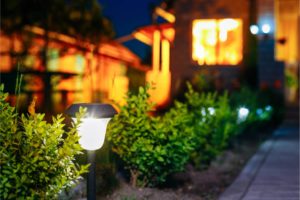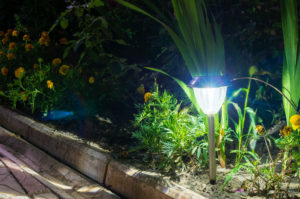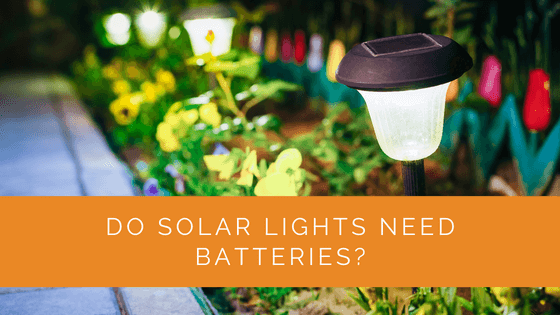Solar lights are an efficient way of fulfilling your illumination requirements. They are not only ecological but also affordable! Naturally, common households are key contributors to this growing economy of solar light.
They are widely used as these solar-powered powered can be installed anywhere. However, have you wondered how they work at night if they are powered by solar energy? The answer is quite simple.
To solve this problem, house owners invest in batteries to store extra energy and utilise it later. Therefore, even though it’s not a requirement, keeping batteries to assist your solar panel can sometimes be handy.
Are you confused if you need to buy light batteries? The short answer is it “depends.” Read this article to find out if your solar system needs one!
Contents
- 1 Key Takeaways
- 2 What Are Solar Lights, and How Do They Use Batteries?
- 3 Types of Solar Lights
- 4 Is It True Even Solar Garden Lights Need Batteries?
- 5 If Solar Lamps Need Batteries, How Are They Better?
- 6 Is It Better to Have Batteries that Can Be Recharged?
- 7 What Kind of Battery Will Be Ideal for Solar Lights?
- 8 How to Tell if Your Batteries Are Dead?
- 9 What Is the Lifetime of Solar Batteries?
- 10 Case Study: Enhancing Garden Lighting with Solar Lights and Batteries
- 11 Expert Insights From Our Solar Panel Installers About Solar Lights and Batteries
- 12 Our Expertise in Solar Lights
- 13 Bottom Line
Key Takeaways
- Solar lights, including garden and outdoor lights, often require batteries to store energy at night or in adverse weather conditions.
- Rechargeable batteries, particularly Nickel Metal Hydride (NiMH) batteries, are recommended for solar lights due to their efficiency, environmental friendliness, and better energy storage capabilities.
- Solar batteries can have a lifespan of up to 15 years, but their durability and performance depend on factors such as type, brand, daily requirements, and maintenance. Proper care of solar equipment is essential for their longevity.
What Are Solar Lights, and How Do They Use Batteries?
Solar lamps, also known as solar lights, produce electricity when solar panels are exposed to sunlight. However, there are times, such as nightfall or bad weather, when the energy from the sun is not available for a stretched period.
This is where solar batteries come into the picture. Batteries help in storing the energy temporarily to be used during such scenarios.
Types of Solar Lights
Various kinds of solar lights available can help for different purposes. Some of these are:
- Driveway solar lights: Have you ever noticed the glowing things that divide a road or mark the borders of one? These are solar-powered lights used to highlight the track at night.
- Solar garden lamps: Solar garden lamps are usually placed in gardens or backyards to illuminate them at night. These lights give a cosy and elegant look to the outdoor areas at night.
- Solar fairy lights: Like any string lights, these are powered by solar instead of electrical energy.
- Emergency solar lights: Solar lights are also used for more conventional reasons, such as safety and security at night. This increases visibility and minimises the chances of accidents.

Is It True Even Solar Garden Lights Need Batteries?
As stated earlier, even solar garden lights need batteries as they power the lights at night. So even when the lights actively convert solar energy to AC during the day, they can’t hold it without batteries.
Hence, solar systems can work best if you know how to utilise them efficiently. Generally, most manufacturing companies take care of this. Thus, you will almost always find batteries in your solar system.
If Solar Lamps Need Batteries, How Are They Better?
This is probably the first question that comes to your mind. If you need a battery anyway, what difference does it make? Of course, they are more energy efficient and easier to maintain. But there is another reason why they are better than normal lights.
Simply put, they are more convenient to use. Unlike regular battery power lights, solar lights don’t have the hassle of socket requirement for plugging it in. You can install them anywhere if sufficient sunlight falls on their panels.
Is It Better to Have Batteries that Can Be Recharged?
Even though different batteries will be compatible with your solar lights, rechargeable ones are your best option. Rechargeable batteries can store the energy for later use. Thus, you can charge these batteries multiple times and use them.
However, if your solar lights are not working with full intensity even after being fully charged, it might be time to replace the batteries. Wondering how to know when it’s time? Well, you notice some signs such as a short span of charge cycle, less bright light, and overall low light standard.
What Kind of Battery Will Be Ideal for Solar Lights?
The essential requirement for solar batteries is to ensure they are not alkaline-based. Even though one can use these batteries temporarily, they are unsuitable for long-term use. So, there are two options for rechargeable batteries:
- Either Nickel Cadmium (NiCd)
- or Nickel Metal Hydride (NiMH) batteries
Both of these are readily available in the market and cheap. However, NiMH rechargeable batteries are better than the other ones. Many reasons make it a superior choice. Let’s see what these are one by one.
Firstly, these are more environmentally friendly than NiCd batteries. Secondly, NiMH batteries perform more efficiently by storing twofold energy compared to the other. This means more output in terms of longevity and intensity of illumination.
Finally, these have a much better memory effect. Constantly, their ability to discharge quickly after repeated gaps in charge is minimal. Hence, the NiMH batteries are a clear win over the NiCd batteries in every possible aspect.

How to Tell if Your Batteries Are Dead?
Like everything else, even rechargeable batteries have an expiry period. While a rechargeable battery gives its best performance between 5 to 10 years, it can sometimes give in completely before time. For instance, it might not turn on one day after being used for a long time.
However, you can perform some tests to determine if they need to be replaced or are dead. For this, you need to replace it with an alkaline one. If the lights work on this change, they must be replaced.
What Is the Lifetime of Solar Batteries?
Solar batteries have a comparatively longer life span of up to 15 years. This makes them worth their price. However, the exact price and durability of the range depend on other factors such as type, brand, daily requirements, and how much you use them.
For instance, lithium-ion-based batteries are more efficient. They are of less weight and are more durable. Similarly, if your requirements are considerable, choose batteries with deep cycles,
Then comes how you use the batteries and where they are installed. For instance, if you live in a moderate temperature, you can consider installing them outside. Last, taking good care of any solar equipment is crucial.
Case Study: Enhancing Garden Lighting with Solar Lights and Batteries
Background
A homeowner wanted to enhance their garden’s aesthetics and functionality by installing solar lights. The aim was to create a well-lit outdoor space that could be enjoyed at night while keeping energy costs low and maintaining environmental responsibility. The homeowner sought a solution that would provide consistent lighting throughout the night, even on days with less sunlight.
Project Overview
The project involved installing a variety of solar lights, including pathway lights, garden lamps, and security lights. The primary challenge was to ensure that these lights would operate effectively after sunset and during cloudy weather, when solar energy capture might be limited. The solution needed to include a reliable energy storage system to store excess energy generated during the day.
Implementation
- Assessment and Planning: The project began with an assessment of the garden layout and the areas requiring illumination. The planning phase involved selecting solar lights with sufficient lumen output and determining the appropriate battery capacity for storing energy.
- Selection of Solar Lights and Batteries: Based on the assessment, the homeowner chose a mix of solar garden lamps, pathway lights, and motion-activated security lights. Each type of light was selected for its specific purpose and location. For the batteries, Nickel Metal Hydride (NiMH) rechargeable batteries were chosen due to their higher capacity, longer life span, and environmental benefits over other types like Nickel Cadmium (NiCd).
- Installation Process:
- Positioning of Solar Panels and Lights: The solar panels were installed in areas with maximum sunlight exposure, ensuring efficient charging. The lights were strategically placed to illuminate pathways, highlight garden features, and enhance security.
- Battery Installation and Setup: NiMH batteries were installed in all solar lights. These batteries were selected for their superior performance in storing solar energy and providing consistent power output throughout the night.
- System Testing and Calibration: After installation, the system was tested to ensure all lights functioned properly and the batteries charged effectively. Adjustments were made to optimise the placement of solar panels and the angle of the lights for maximum efficiency.
Results
The solar lights provided reliable illumination throughout the garden, even on cloudy days, thanks to the efficient energy storage system. The homeowner reported a significant improvement in the garden’s nighttime ambiance and enhanced security due to the well-lit pathways and motion-activated lights. Additionally, the use of solar lights resulted in no increase in electricity bills, aligning perfectly with the homeowner’s sustainability goals.
Summary
Installing solar lights with reliable battery storage can transform an outdoor space into a well-lit, secure, and aesthetically pleasing area. In this case, using NiMH batteries ensured that the solar lights provided consistent illumination, regardless of weather conditions. At Solar Panels Network, we specialise in providing tailored solar solutions, helping homeowners achieve their lighting and sustainability goals efficiently and effectively.
Solar lights, when paired with the right batteries, offer a practical and eco-friendly way to illuminate outdoor spaces. The case study highlights the importance of selecting appropriate batteries to ensure that solar lights perform optimally, providing reliable and sustainable lighting solutions for gardens and other outdoor areas.
Expert Insights From Our Solar Panel Installers About Solar Lights and Batteries
Solar lights are incredibly convenient because they can store energy during the day and use it at night. This is made possible by rechargeable batteries, which are an integral part of any solar lighting system.
Lead Solar Technician
Choosing the right type of battery, like NiMH, ensures that your solar lights perform well even after numerous charge cycles. This not only improves efficiency but also extends the lifespan of your solar lighting system.
Renewable Energy Specialist
Maintaining your solar lights and their batteries is crucial. Regular checks and replacements when needed can keep your lights shining bright and reliable throughout the year.
Solar Product Consultant
Our Expertise in Solar Lights
At Solar Panels Network, we’re here to provide you with valuable information and support regarding solar lighting. With our experience and understanding of the solar lighting industry, our team of experts is prepared to assist you in finding the right lighting solution for your needs. Whether you’re interested in improving your outdoor spaces, conserving energy, or adopting a more sustainable approach, we’re well-equipped to help. Please feel free to contact us with any questions or inquiries.
Bottom Line
Solar lights are gaining popularity among homeowners. These lights are inexpensive and have a low cost of maintenance. At the same time, you also get a chance to reduce your carbon footprint. Consequently, using these lights makes your today and tomorrow both better.
Remembering that batteries are a better option for optimal usage would be best. Even though these lights derive energy from the sun, they need a device to store it. NiCd or NiMH batteries solve this problem quite efficiently!
About the Author
Solar Panels Network stands at the forefront of solar energy solutions, driven by a team of seasoned solar engineers and energy consultants. With over decades of experience in delivering high-quality solar installations and maintenance, we are committed to promoting sustainable energy through customer-centric, tailored solutions. Our articles reflect this commitment, crafted collaboratively by experts to provide accurate, up-to-date insights into solar technology, ensuring our readers are well-informed and empowered in their solar energy decisions.

